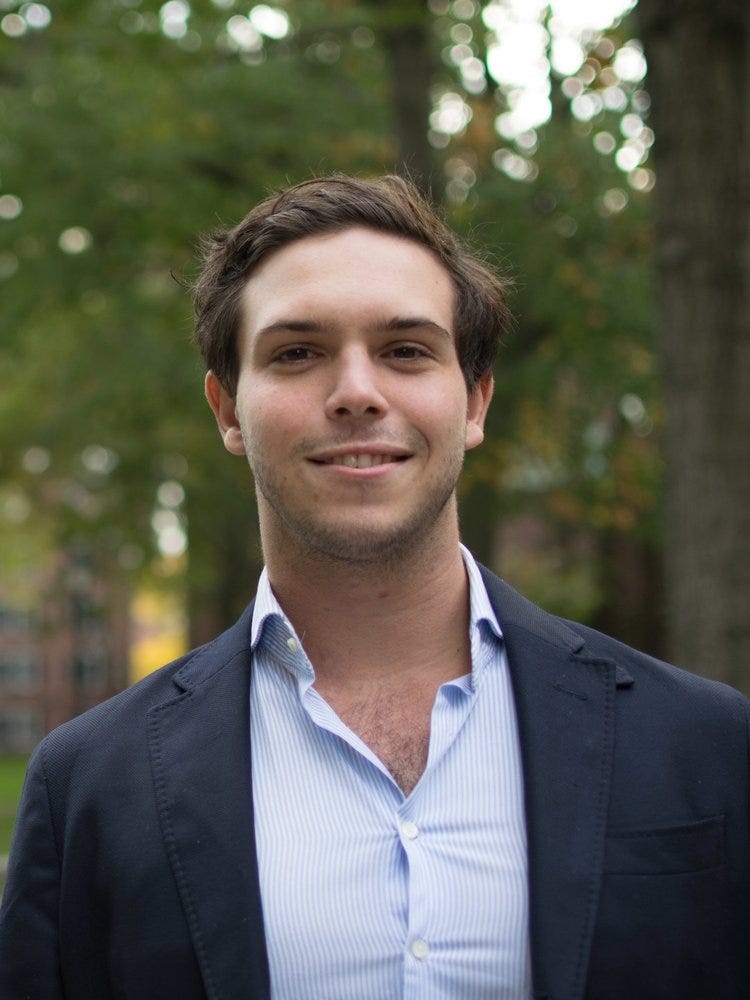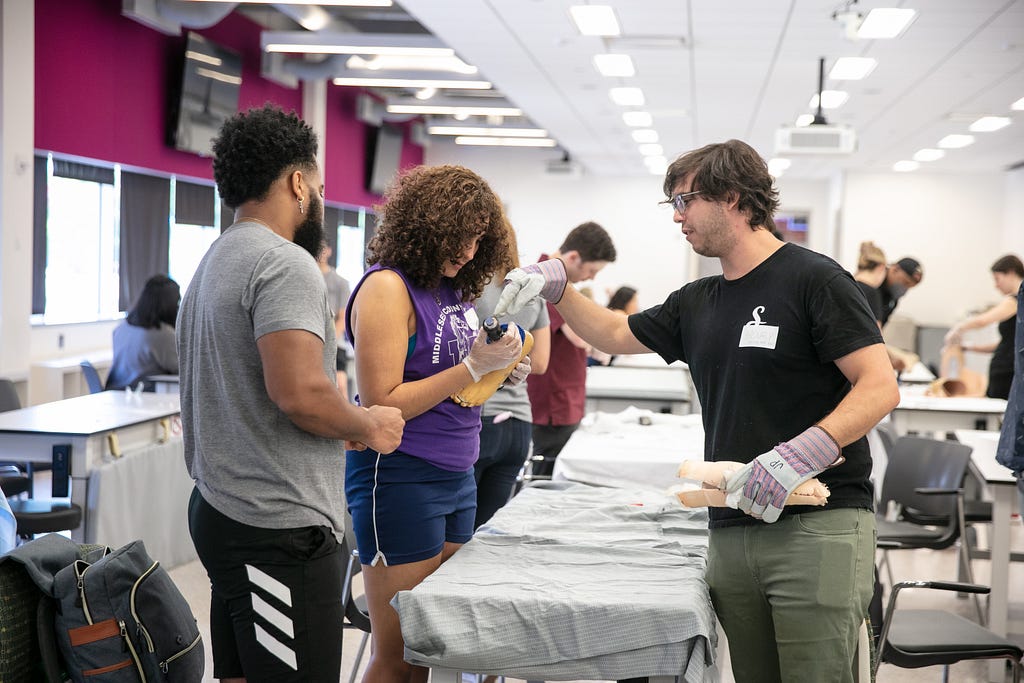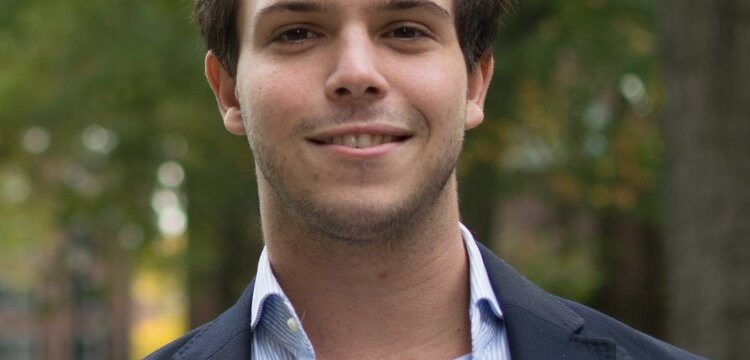Social Impact Heroes: Why & How Henry Iseman of Penta Medical Recycling Is Helping To Change Our World

If you are not ahead, you are behind: Everything takes longer than expected, whether it is receiving printed materials for an event, hiring the right person for a new role, or getting a shipment into a country. You have to build in time to manage these situations.
As part of my series about “individuals and organizations making an important social impact”, I had the pleasure of interviewing Henry Iseman.
Henry Iseman, born and raised in New York City, is Founder and Executive Director of Penta Medical Recycling. After seeing the life-changing impact of prosthetic limbs while working with U.S. veterans, Henry was determined to make prosthetic care more accessible to amputees worldwide. Mr. Iseman joined forces with fellow students at Yale to create Penta’s earliest efforts in Vietnam. Since then, Henry has grown Penta into a global operation and non-profit through his day-to-day management, strategic leadership, and fundraising efforts.
Thank you so much for joining us in this interview series! Can you tell us a story about what brought you to this specific career path?
It all started with a high school internship at an organization called Shoulder 2 Shoulder, where I was working closely with military vets who had recently lost their limbs. I saw firsthand the transformative power of prosthetic care — the way in which prosthetics enabled amputees to leave the hospital and return to their day to day lives. Whether that meant playing sports with their children, organizing weekend trips, or returning to work.
In college, my roommate and his girlfriend, who grew up in Vietnam, shared with me the barriers to prosthetic care felt throughout Southeast Asia. I did research and discovered that prosthetic care is actually out of reach for 90% of the world’s 65–100 million amputees — a staggering statistic that I felt determined to change. Despite the desperate need for prosthetic care across the world, hundreds of thousands of limbs are being discarded annually in the US, most of them still completely functional.
So, I joined forces with my college roommate and his girlfriend, and together we began collecting limbs locally and transporting them in suitcases to hospitals in Vietnam. Since then, Penta incorporated as a non-profit in 2018, growing from this student team to a full-time staff global organization delivering prosthetic limbs to 20 countries across every continent.
Can you share the most interesting story that happened to you since you began leading your company or organization?
After receiving a limb from Penta Medical Recycling, one of our first patients, Ha, was not only able to regain mobility, but he was actually able to save someone else’s life. Ha lost his leg to a landmine in 1983 while fighting in the Cambodian-Vietnam War. For over 30 years, Ha used an old wooden prosthesis that was not waterproof. This prosthesis was not able to endure the wet conditions of Vietnam’s lengthy monsoon seasons, could not support him in his role as a security guard, and made it challenging for him to fulfill his dream of traveling the world and exploring Vietnam.
After receiving his new, lightweight, waterproof prosthesis from Penta, Ha was finally able to travel as he always desired. On a boat tour of Ha Long Bay, a young girl fell into the water and began to drown. Because of his new prosthesis, Ha was able to jump into the sea and save the young girl’s life. Had he still been using his old prosthesis, Ha would have needed to remove the limb in order to enter the water — otherwise, that limb would have caused him to drown as well.
It has been said that our mistakes can be our greatest teachers. Can you share a story about the funniest mistake you made when you were first starting? Can you tell us what lesson you learned from that?
When we first made our move to incorporate as college seniors, we were on a tight schedule with graduation and the departure of my co-founders back home to Vietnam and Hong Kong. Our team was also split between Yale and Brown universities, which sometimes led to missed communications. The initial filing for Penta Prosthetics was not for the right type of corporation and we had to re-file. However, we had to find a new name while Penta Prosthetics was dissolved, which we knew was going to be a slow process. We were frustrated since this name was important to us, but had to compromise and incorporate as Penta Medical Recycling.
Ultimately, this turned out to be a benefit, as the name has allowed us to take on a broader view of our goal of delivering mobility globally. Giving second lives to these devices often provides second lives to individuals who have had a great deal taken from them. While many still use and associate the name Penta Prosthetics with our operation, this name change has made a difference for the organization.
The lesson here was the ability to adapt and not cling to everything that was part of our initial vision. Mistakes can be fruitful, even though the way in which they resolve may not always be immediately clear. At the same time, coordination between team members who may be far apart which is all the more relevant today — is always important in executing our mission properly on both projects small and large.
Can you describe how you or your organization is making a significant social impact?
Penta believes that mobility should not be determined by socio-economic status and is determined to remove the financial barriers that prevent individuals from acquiring prosthetic care. Prosthetic care is not only integral to an amputee’s physical mobility, but is also integral to one’s social and economic mobility. Amputees who have the appropriate equipment are able to work and provide for their families, return back to school, and ameliorate any community stigma that many amputees often face.
Can you tell us a story about a particular individual who was impacted or helped by your cause?
Chase is a 12 year old quadruple amputee, who was born and raised in the Philadelphia area. As a quickly growing boy, Chase is frequently outgrowing his prosthetic equipment, leaving him with what he describes as “a bedroom full of legs”. Frustrated by the expanding pile of legs in his room, Chase searched for an organization that would put his legs to use. He found Penta.
Penta was able to find a match for Chase’s legs through a partner organization in Liberia called Elizabeth’s Legacy of Hope (ELOH). Now, a young boy named Samuel wears one of Chase’s old limbs. With his new prosthetic leg, Samuel has been able to return to playing soccer and can now comfortably and efficiently travel to and from school.
Are there three things the community/society/politicians can do to help you address the root of the problem you are trying to solve?
In many of the countries Penta operates, access to prosthetic and orthotic equipment is expensive, unavailable, or considered not medically necessary. The international global health community and governing bodies around the world should work together to make this equipment more readily available to amputees and affordable as an immediate and necessary form of treatment. This will require collaboration between equipment manufacturers, healthcare providers, and medical insurance systems. In the US, this means government recognition of the value of second-hand equipment and the break down of barriers to care.
The community can advocate for this change, and can also lead the charge by donating equipment and helping to get the ball rolling on an effective system that creates equitable access to healthcare and treatment. As organizations like Penta learn more and more about how to successfully repurpose this equipment, we can eventually guide officials in restructuring the way second-hand or unsold medical equipment is disposed of and treated legally.
Society as a whole can assist in this effort by recognizing and promoting the importance of the right to mobility for persons with disabilities. Few people understand that disability is something likely to affect them or their families, even if they are not part of the disabled community. De-stigmatizing disability and advancing efforts to provide care globally, is an investment in a better future as many individuals will feel the positive impact of the change they push for, whether it is in 5 or 50 years’ time.
How do you define “Leadership”? Can you explain what you mean or give an example?
Leadership means showing commitment and passion for your mission in all regards, both as an individual and for the organization in its field. Showing enthusiasm for your work, and all of its complexities and challenges, is key to uniting others around a common goal. I’ve seen this in Penta’s role connecting so many different organizations that provide mobility in different ways. Penta’s model is very flexible, allowing us to work with many organizations of different structures, sizes, and mission orientations. Whether they are manufacturers with excess stock dealing with the burden of sorting and disposing of old inventory, or U.S. based missions running clinics and transporting equipment overseas in need of proper equipment quickly, we are able to find the ways in which we can advance their mission, which in turn also advances ours. In this capacity to work with others, collaborate instead of compete, and find common goals, I believe Penta has emerged as a leader.

What are your “5 things I wish someone told me when I first started” and why. Please share a story or example for each.
- If you are not ahead, you are behind: Everything takes longer than expected, whether it is receiving printed materials for an event, hiring the right person for a new role, or getting a shipment into a country. You have to build in time to manage these situations.
- Perfection is the enemy of good: You can’t wait until everything is perfectly set up for something to happen. In the earlier stages of Penta’s development, I was constantly delaying taking the next step because I felt like the current thing I was working on was not yet perfected. This was just delaying the non-profit’s growth.
- Don’t fear informal communication styles: When I learned to communicate with people in the manner in which they wanted to communicate, I noticed new opportunities arising. After years of crafting perfectly worded, formal emails, I found that a quick text or a cold call led to far lengthier conversations.
- Never underestimate a social connection: If you think an event you’ve been invited to, or a person you’ve been connected to, may not be relevant or worth engaging with, think hard about this and strongly reconsider. I was once invited to a local political fundraiser by a neighbor in my apartment building in New York. With a big project bearing down on Penta, I felt I did not have the time or bandwidth to accept or attend. However, I ultimately decided that I would go for ten minutes and politely leave. Instead, I ended up staying the evening, engaging in conversation with a number of individuals who had serious interest in my work with Penta. These discussions led to introductions to future supporters, and even a close advisor.
- Trust your intuition: Advice and outside expertise is essential, but remember to balance this with your own intuition and close understanding of your own goals. Years ago, a director of another nonprofit organization expressed to me that Penta had to focus regionally to be successful. He believed that we would not be able to take on the logistical burden of a global operation at our early stage, and thought that we should pursue our operation locally in the countries where we started. I disagreed with him and continued on with my goals. Just 4 years after that conversation, we have a smooth operation delivering valuable equipment to 20 countries on every continent.
You are a person of enormous influence. If you could inspire a movement that would bring the most amount of good to the most amount of people, what would that be? You never know what your idea can trigger. 🙂
One of the main things that Penta is trying to accomplish is to reduce the amount of waste that can be repurposed and used by others. And while we are focusing on this through the lens of mobility and prosthetic care, I hope, and have actually been told by others, that Penta’s mission inspires individuals to look around them and recognize everything else that is being wasted when it could be life-changing for someone else. Whether that be eyeglasses, crutches, old clothes or shoes, perhaps even furniture or a bicycle, I hope we inspire individuals to ask themselves, “Who else might want or need this?” instead of simply discarding it.
Can you please give us your favorite “Life Lesson Quote”? Can you share how that was relevant to you in your life?
“You miss 100% of the shots you don’t take.” This has rung repeatedly true to me, whether it was a gamble I took that played out better than expected, or on the flip side, the regret of not doing something that I later knew could have been successful. It certainly pertains to the founding of Penta. As a senior in college trying to plan out my future, starting a new non-profit organization that needed to be incorporated felt like a major risk. In fact — I almost backed out. Luckily, I stuck with it.
The moral also holds true for all manner of smaller acts. I recently sent a cold email to a world famous investor and billionaire who I had heard speak at an event. You can imagine my surprise when he answered me directly on the same day, offering to make a valuable connection.
You never know how people will respond to that with which you present them, so it’s always worth giving it a try. More often than not, there’s less to lose than you think, but a great amount to gain.
Is there a person in the world, or in the US with whom you would like to have a private breakfast or lunch with, and why? He or she might just see this, especially if we tag them. 🙂
I would give anything to have the opportunity to meet MacKenzie Scott — though, I can’t imagine a non-profit founder who would not share that same sentiment. The way in which she is handling her philanthropic endeavors, supporting wide-ranging missions, and transforming non-profits, is setting a new model for those who are financially able to do so. She is very thoughtful in how she is donating her money — she understands the power of her contributions and the amount that is needed to truly make an impact. She is extremely strategic, and lacks any hesitancy, in unleashing that power for good.
How can our readers further follow your work online?
Penta’s website (https://pentaprosthetics.org/) is a great resource for readers to learn more about our countries of operation, read patient impact stories, and find out how to contribute to our mobility-restoring work. Our social media pages (Instagram: @penta.medical.recycling, Facebook: https://www.facebook.com/penta.medical.recycling, Twitter: @PentaRecycling) allow visitors to get live updates on shipments, ask questions in real time, and engage with the Penta team.
We are extremely grateful to all who choose to support Penta’s mission — whether that means donating old prosthetic equipment, organizing local fundraising events, or even just visiting our website to become more familiar with our work.
This was very meaningful, thank you so much. We wish you only continued success on your great work!
Social Impact Heroes: Why & How Henry Iseman of Penta Medical Recycling Is Helping To Change Our… was originally published in Authority Magazine on Medium, where people are continuing the conversation by highlighting and responding to this story.
